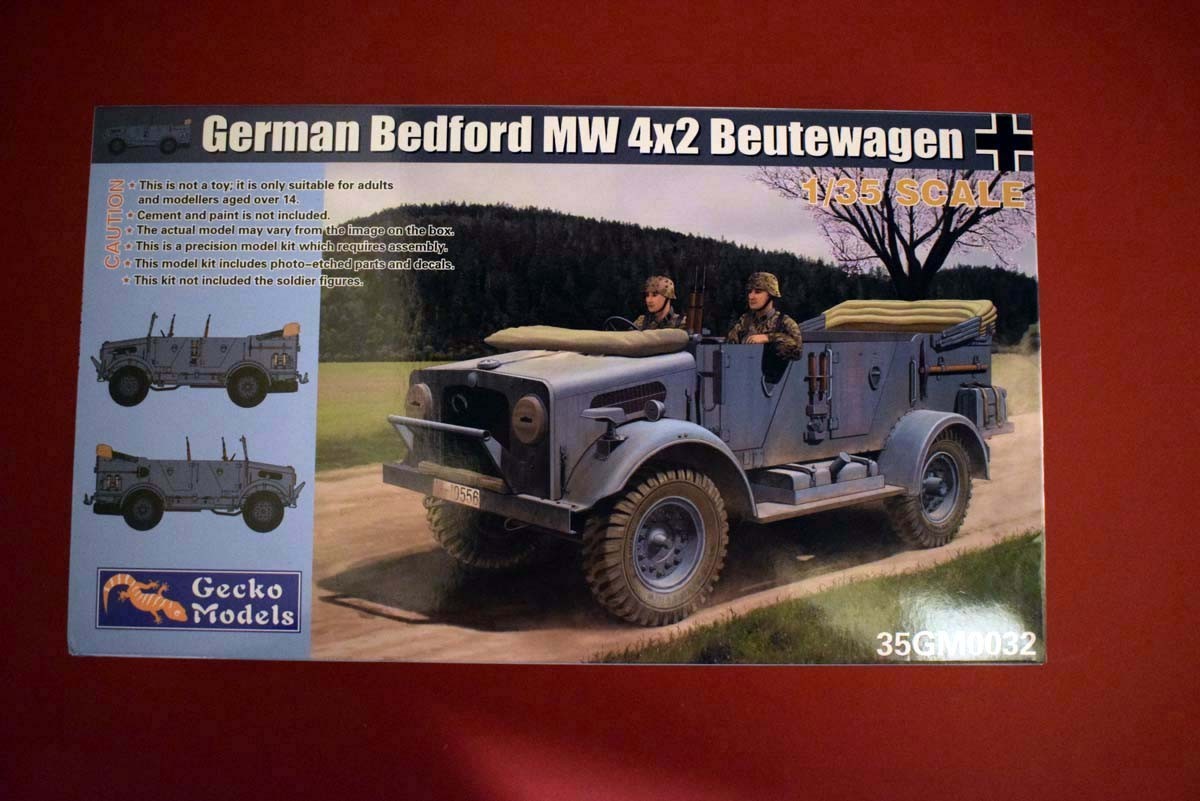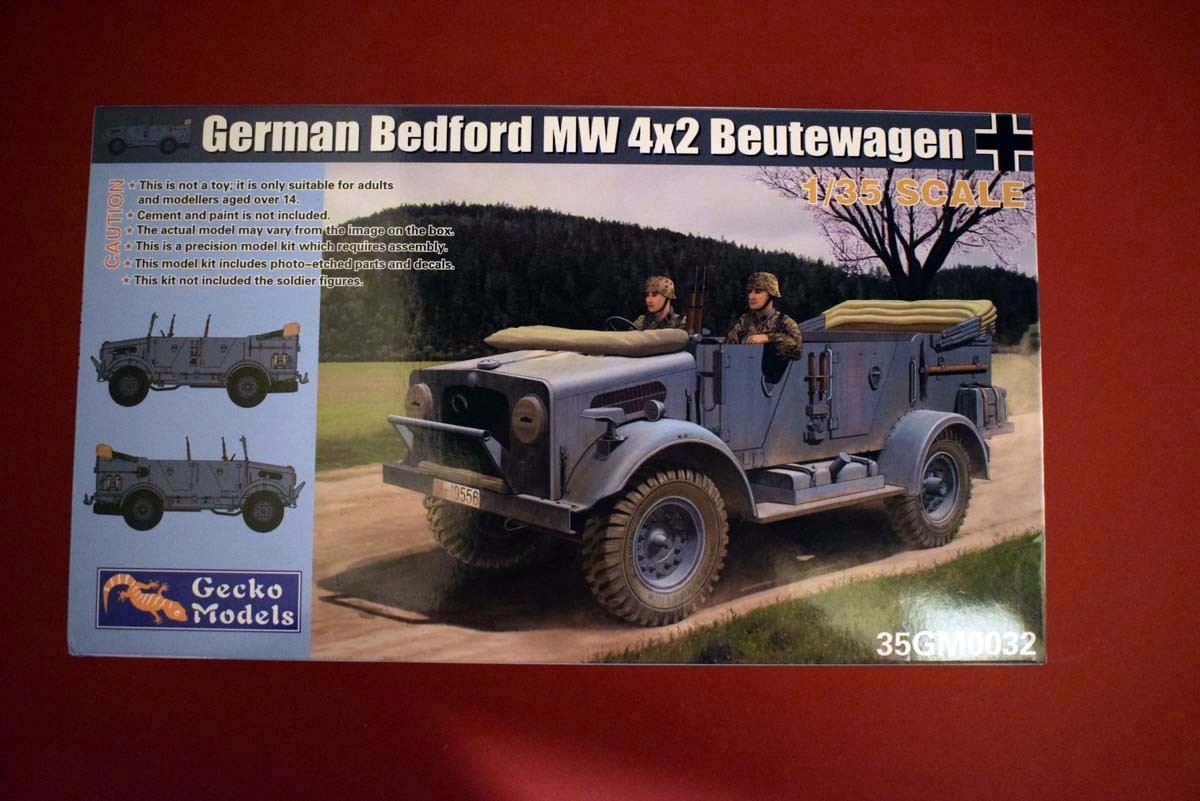
Introduction
The following introduction is as provided by Gecko Models:
Bedford was the trade name used by Vauxhall Motors of Luton, Bedfordshire, for commercial vehicles manufactured by the company. Vauxhall Motors was purchased by General Motors in the 1920s, joining firms such as Chevrolet, GMC and the German company Adam Opel AG, in an early multi-national conglomerate. There was a degree of commonality between products produced by the companies within the GM group such as shared engine designs. As war clouds gathered in 1935, the British Government, through the Ministry of Supply and the War Department, invited British truck manufacturers to design and submit foe testing, two wheel drive (4x2) 15 cwt trucks which could be used for a variety of purposes. It was expected that the designs would incorporate a significant number of off-the-shelf parts to reduce costs. In addition to detailed technical inspections, the testing would include demanding road tests including the ascent of steep road passes in Snowdonia in North Wales. By the 1937trials, the Bedford 15 cwt design had evolved into what ultimately became the MW. The need for space to fit military equipment such as a substantial air filter meant that the engine compartment had had to be widened requiring a wide flat front which became a key distinguishing feature of all wartime two wheel drive Bedford trucks up to 5 tons.
In common with other military vehicles of the 1930s, early MWs had an open cab with aero-screens, canvas aprons in place of doors and a canvas roof. It was only later in the war that a closed cab with a proper windscreen and doors was introduced. Towards the end of production, in common with other British vehicles, a hip ring was introduced into the canvas-work of the cab for anti-aircraft purposes. The ubiquitous Bedford MW chassis was used for a General Service Truck (MWD), a radio truck (MWR), a 200 gallon water tanker (MWC) as well as a gun portee for the Hotchkiss 25mm or 2Pdr A/Tank guns (MWG), a gun tractor for the 6 Pdr A/Tank gun (MWT) and as a mount for the 20mm Polston LAA gun on the MWC chassis. Other uses include the fitting of house type bodies (MWR) and van bodies (MWV) for the RAF who also used other variants, notably the MWD tender and MWC water tanker. Approximately 66,000 Bedford MWs of all types were manufactured before and during WWII. They were used in most theatres of war and a few remained in service until the late 1950s >early 1960s.
A large number of early areo screen MWD general service trucks were captured by the German army during the battle of France and in the aftermath of the Dunkirk evacuation. Although attempts had been made to deny the use of these trucks to the enemy, Bedford was part of the General Motors Group - an early multi national company, which also included the German motor manufacturer Adam Opel AG. Therefore a certain amount of commonality between vehicles built by the different parts of the GM group. Contrary to the popular belief engendered by the Blitzkrieg, the Wehrmacht was not particularly mechanised at the beginning of the war. The (Gift) of thousands of potentially re-buildable trucks was therefore particularly welcome. A substantial rebuild programme was therefore installed on a significant scale. The commonality of GM parts across constituent GM companies undoubtedly assisted with this process. Although most MWDs were simply refurbished as general service trucks, a significant number were sent to specialist body builders where a standard design of cross country car body was fitted. Although many thousands of rebuilds were completed, it is likely that most were lost on the Eastern front during Operation Barbarossa and the slow retreat that followed.
Review
This offering from Gecko Models arrives in the usual packaging of a flip top cardboard box, with a separate card lid showing the artwork. In my past experience I have found this does a very good job of protecting the contents, due to the number of damaged cardboard boxes that have arrived. The sprues are packaged in a number of sealed plastic bags and Ziploc bags which helps prevent damage to the parts. Examination of the contents raises no immediate concerns.
The chassis of this model is an accurate representation of the real thing so far as I can tell from reference photos of the real thing, and Gecko Models has provided the chassis as a multi part offering. This means that care will need to be taken during construction to ensure that the chassis is true. There are a number of parts that need to be added to the main frame, which are small in size in many cases and so remember to take your time and check fit prior to adding glue. There are also a small number of photo etch parts which adds a particularly fine level of detail. The spare wheel, which is stored under the vehicle lends itself to be left off until the painting stage is well under way. Gecko Models has provided the wheels fully in plastic, with the tyre tread moulded as one part and the tyre side walls and trims moulded as separate pieces. Again if you wish to leave the wheels off until after the painting process, the design again lends itself to that approach.
A full engine and transmission has been provided, and surprisingly most of it is in plastic. There are a few very small photo etched parts, which during application I can hear modellers swearing now!!! A very nice rendering of the radiator and its housing have been provided, along with the pipes that connect it up. The modeller will need to add some wires and such to finish this area to a high degree. The axles of the model have been designed to allow the front wheels to be turned, and I can only say thank you as it is something I like to see. Fuel tanks are also well replicated, but you will need to add the fuel lines.
The interior of the model has well done seat structures, and instrument panel layout and I am pleased to see that the steering wheel is on the right indicating a British vehicle. An anti-slip tread is present on the floor and there are some elements added to the engine bay side of the firewall, including some of the wiring loom being present. The interior structure of the side walls is as it should be and fairly plain. Guns storage racks have been included, with a choice of photo etch or plastic, and the rifles for storage in them have been provided clean and so can be shown in or out of the rack as required. The doors of the vehicle are separate, and have separate door furniture as well with a nice touch being them having been designed to allow them to be shown open or closed. The hood covering the engine bay has been accurately replicated and so showing it open, even though not shown in the instructions is possible. The photo etched vents for the side of the engine bay are a nice touch.
Fixtures and fittings on the outside of the vehicle are supplied clean in the case of tools, with the brackets in photo etch. Lights have been provided in two forms, the slit lights most seen on British vehicles are present, as well as shrouded lights. One element that is going to test every modeller I believe are the spring tie downs for the hood. Each of these consists of five separate parts, with a plastic spring and both the latch and catch separately supplied in photo etch for both ends of the spring. The glazing for the windscreen has been well done and I like that Gecko Models has provided three options, you can have the windscreen up or down and if down it can be bare or covered. The folding roof has been provided in the down position only, with finishing touches being storage racks for fuel, and the number plates and convoy lights being present.
Gecko Models has provided three finishing options for this release which are:
German 2nd SS Panzer Division, Eastern Front, 1941
Unknown German Waffen SS Anti-tank Unit, Eastern Front, 1941
German Unknown Unit, Eastern Front, 1941
Conclusion
This offering from Gecko Models of a Bedford MW is an extremely well designed model, with many of the features of the real vehicle being possible to replicate with the kit. By this I mean doors open, engine bay open etc. Which is a nice touch in 1/35th scale and something you don not often see in car models in 1/24th scale. However this level of detail does mean that the modeller does need to have a reasonable skill level, steady hands and a good eye. I believe the hardest part of this release will be the bonnet tie downs, as they are extremely well detailed and accurately reproduced to be shown open or closed. There are only two things missing, one of which is a deployed hood which I suspect will be in a future release and it would have been nice to see one or more of Geckos wonderful figures to show in the vehicle. In all other regards as to what is provided all I can say is very well done.

